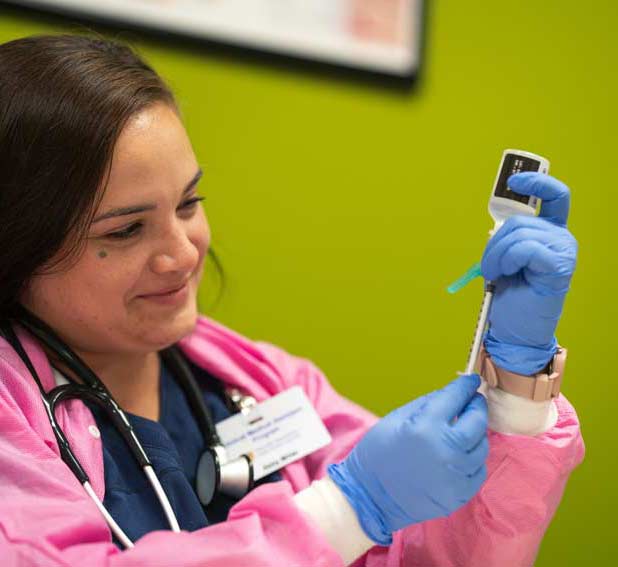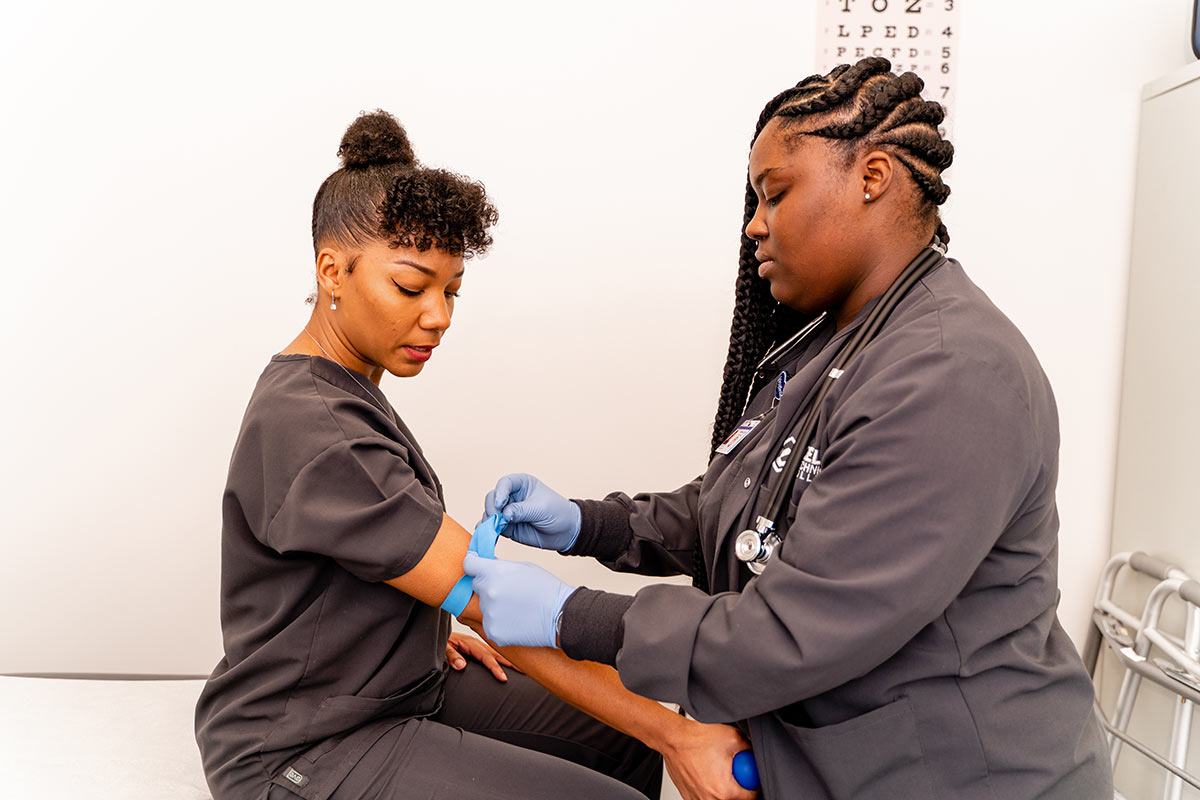How Phlebotomy Courses Near Me Can Fast-Track Your Entry into the Healthcare Field
How Phlebotomy Courses Near Me Can Fast-Track Your Entry into the Healthcare Field
Blog Article
The Course to Qualification: Recognizing the Phlebotomy Training Course Journey and Its Value
As you consider the course to certification in phlebotomy, it is necessary to comprehend the function you'll play in health care. Your training will certainly cover crucial skills, from blood collection strategies to patient communication. Each part of the program prepares you for the obstacles in advance. Yet exactly what does the trip require, and why is accreditation so critical for your future profession? Allow's discover these inquiries additionally.

The Role of Phlebotomists in Medical Care
Phlebotomists play a crucial function in the healthcare system, working as the essential web link between patients and necessary diagnostic testing. You'll execute blood draws, making certain samples are accumulated precisely and securely. Your experience helps in identifying clinical conditions, checking health and wellness, and leading treatment choices.
In your daily interactions, you'll require to establish trust fund with clients, making them really feel comfortable during what could be a stressful experience. You are accountable for labeling and dealing with examples thoroughly to stop contamination or errors, which might influence test results.
Past this, you'll usually function alongside doctors and nurses, interacting important details concerning people' problems. By understanding your abilities, you add meaningfully to person treatment, making you a crucial component of the clinical group.
Introduction of Phlebotomy Training Programs
When discovering phlebotomy training programs, you'll discover different types developed to fit different routines and discovering styles. Each program helps you develop essential abilities like blood collection and person communication. Comprehending these choices is essential to choosing the best path for your job.
Sorts Of Educating Programs
Several types of training programs are readily available for those aiming to come to be skillful in phlebotomy. You can select from certification programs, which usually last a few months and concentrate on necessary skills. There are also diploma programs that give a more comprehensive education, frequently lasting approximately a year. If you're trying to find a deeper understanding, an associate level in an associated field could be the best fit. On-line programs provide flexibility for those stabilizing work or family members commitments, permitting you to examine at your own speed. Additionally, some hospitals and facilities provide on-the-job training programs, giving useful experience while you find out. Whatever path you pick, each program aims to outfit you with the necessary abilities for a successful phlebotomy job.

Trick Skills Created
Mastering phlebotomy calls for a set of key skills that are developed via extensive training programs. Additionally, interaction skills are basic; you'll need to interact with people, discuss treatments, and placed them at simplicity. Each of these abilities is vital for your success as a certified phlebotomist, making you a beneficial asset in any kind of healthcare setup.
Secret Elements of a Phlebotomy Program
In a phlebotomy course, you'll concentrate on important subjects that prepared for your future occupation. You'll take part in hands-on training that allows you to use what you've discovered in real-world setups. Both the curriculum and functional experience are vital for your success as a phlebotomist.
Curriculum Overview
While going after a phlebotomy training program, you'll encounter a curriculum made to equip you with essential abilities and knowledge. Phlebotomy school. This educational program generally consists of makeup and physiology, concentrating on the circulatory system and comprehending blood parts. You'll additionally learn more about different sorts of blood collection techniques, consisting of venipuncture and capillary slit techniques
Furthermore, infection control and safety procedures are essential components, ensuring you recognize just how to preserve a sterilized environment. You'll study patient communication, highlighting communication and empathy, which are vital for relieving patient anxiety.
Hands-On Training Experience
Obtaining hands-on experience is an indispensable component of your phlebotomy training course. This useful training permits you to use what you've learned in a real-world setup, boosting your skills and self-confidence. You'll exercise venipuncture techniques, find out just how to deal with different kinds of specimens, and obtain knowledgeable about the devices made use of in the area. Under the guidance of seasoned trainers, you'll refine your abilities, ensuring you're planned for any scenario you may face.
In addition, you'll get the possibility see page to communicate with people, which is vital for creating your communication abilities. This mix of technical effectiveness and interpersonal abilities is critical for your success as a licensed phlebotomist. Inevitably, hands-on training is where theory fulfills practice, solidifying your expertise and preparedness for accreditation.
Certification and Licensing Demands
Prior to you can begin your career in phlebotomy, it is crucial to recognize the certification and licensing requirements that vary by state. A lot of states call for phlebotomists to hold a certification from an identified company, such as the National Phlebotomy Association or the American Society for Scientific Pathology. These certifications usually entail passing a test that tests your knowledge and skills in the field.
In enhancement to certification, some states have details licensing requirements. You may require to finish a particular variety of hours in clinical practice, submit evidence of training, or undertake a history check. It is essential to investigate your state's regulations to make sure you fulfill all necessary standards.
Remaining educated concerning these needs not just aids you safeguard a placement yet likewise improves your reputation as a specialist. By meeting these demands, you'll be well on your method to a successful career in phlebotomy.
Hands-On Training and Practical Experience
Hands-on training and useful experience are essential elements of your phlebotomy education, as they allow you to apply theoretical knowledge in real-world situations. Throughout your training, you'll take part in monitored venipuncture, find out appropriate techniques, and become accustomed to different blood collection devices. This direct involvement is critical for constructing your self-confidence and developing your skills.
You'll function carefully with experienced specialists who can guide you through the subtleties of individual interaction and example handling. Each session not just strengthens your understanding but additionally prepares you for the hectic environment of medical care settings.
Additionally, several programs integrate clinical turnings, allowing you to experience varied settings, from health centers to outpatient centers. This direct exposure assists you adjust to different obstacles and individual needs, ensuring you're well-prepared for your future duty. Embrace these possibilities, as they're important to becoming an experienced and caring phlebotomist.
Obstacles Faced Throughout Training
While obtaining hands-on experience is important, it's essential to acknowledge the obstacles that can emerge during your phlebotomy training. Additionally, mastering the skills required for blood attracts takes technique; you might struggle with technique initially.
Time management can also be a hurdle, as balancing theory, useful sessions, and personal commitments can really feel intimidating. You may face varying learning rates amongst dig this your peers, bring about sensations of insecurity if you assume you're falling back. Adapting to the various individualities of teachers can be difficult, as each might have a special mentor style.
Recognizing these barriers early on can prepare you for success and aid you establish durability throughout your training journey.
Career Opportunities After Qualification

As you gain experience, you may even take into consideration specializing in locations like pediatric or senior citizen phlebotomy, accommodating details patient requirements. Some phlebotomists i loved this choose to advance their jobs by becoming lab technicians or going after more education in health care areas.
Additionally, your accreditation can bring about roles in training or managing brand-new phlebotomists, permitting you to share your knowledge. With the health care sector continually growing, your skills will certainly constantly remain in need, leading the way for a steady and meeting career. Embrace the chances awaiting you!
Frequently Asked Concerns
What Is the Common Duration of a Phlebotomy Educating Training Course?
Phlebotomy training programs typically last around four to eight weeks. You'll engage in hands-on method, classroom direction, and on the internet understanding. Finishing this training prepares you for qualification and a rewarding career in healthcare.
Are Online Phlebotomy Courses Available?
Yes, online phlebotomy courses are available. They provide flexibility and benefit, enabling you to examine at your very own speed. Just confirm the program is certified to satisfy accreditation requirements and gain valuable skills for your job.
Just How Much Does Phlebotomy Training Typically Expense?
Phlebotomy training typically sets you back in between $700 and $2,500, relying on the program and place. You ought to consider factors like training course size, included materials, and hands-on experience when picking the appropriate training for you.
What Prevail Requirements for Phlebotomy Training?
Usual requirements for phlebotomy training typically consist of a secondary school diploma or GED, booster shots, and a background check. Some programs might likewise need fundamental healthcare understanding or certifications, ensuring you're gotten ready for hands-on training.
Can I Work While Completing My Phlebotomy Training?
Yes, you can function while completing your phlebotomy training. Several trainees equilibrium jobs with their research studies, but ensure to manage your time successfully to assure you satisfy both work and training dedications successfully.
Report this page